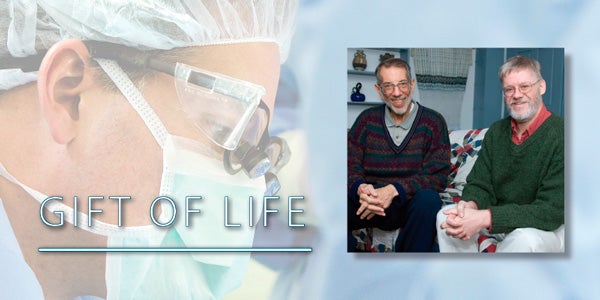Gift of Life

On average, 17 people die every day—6,600 each year—waiting for an organ transplant or donated tissue. Many die before organs become available.
David Gitlitz, 66, a long-time professor of Spanish who retired last spring, is one of the lucky ones. Seven people each offered to donate a portion of their liver to him.
|
But let’s start at the beginning. Gitlitz has been Alpha-1 antitrypsin deficient since birth, thanks to an unwelcome confluence of family genes. Alpha-1 attacks the liver and/or lungs. While it may eat away silently and undetected for decades, eventually it makes itself known.
Gitlitz found out he had the condition a dozen years ago when he had an emergency appendectomy. While in the abdominal neighborhood, the doctor took a look at his liver and recommended that Gitlitz see a pulmonary specialist who was also an Alpha-1 specialist.
By last year, Alpha-1 had destroyed about 10 percent of Gitlitz’s lung capacity, essentially through emphysema, and nearly all of his liver. His ability to function was severely limited. The best chance he had for survival was a liver from a live donor.
That’s when Daniel Carpenter, Gitlitz’s colleague who teaches Latin, Greek, and classical civilization courses as a full-time ad hoc lecturer, volunteered to donate 60 percent of his liver.
“When I learned that David was going on the transplant list, I realized that for the first time in my life I had the opportunity to save a life and thought that I should not pass it up,” explains the 44-year-old. “The team at the Lahey Clinic allayed most of my fears. The chance of a catastrophic complication was less than one half of one percent, though, of course, there was still some trepidation.”
“I’m still blinking at the wonder of it,” says a grateful Gitlitz. “The operation’s not trivial for the donor, even though the remaining 40 percent will, like a salamander’s tail, regenerate itself. Still there’s a protracted recovery period and the surgery leaves a scar the size of the old Jamestown Bridge.”
In addition to Carpenter, six other people offered to share their livers with Gitlitz—his brother John, his two daughters Deborah and Abby, Abby’s friend Richard Willey, and two good friends, David and Susan Offer who now live in Maine.
Matching livers requires compatible blood types, comparable body mass, and similar placement of ducts, veins, and arteries. Donors should be in good health, under 60, and free of disease.
Five of the seven potential donors were eliminated or relegated to the liver-of-last resort list, leaving Carpenter and Willey. Both were rejected as donors for questions of weight, body mass, and/or body fat.
Both men went on diets and stepped up their exercise regimen. Within three months, Carpenter lost about 25 pounds. His second biopsy revealed a liver fat level below the necessary minimum.
The surgery was performed last March. Dr. Elizabeth Pomfret removed 60 percent of Carpenter’s liver during a six-and-a-half-hour surgery and handed it to her husband, Dr. James Pomposelli, who, after removing Gitlitz’s diseased liver, replaced it with Carpenter’s healthy one. Much to Gitlitz’s surprise, it turned out that Pomposelli was a URI alum, Class of 1982.
Most of Carpenter’s liver regenerated in the first three months. He expects to recover between 80 to 100 percent of his liver mass within the year. Initially, Carpenter tired easily, but he improves daily as his liver regenerates.
Gitlitz lost 75 pounds after winter break, 40 of them aftet the eight or so hours of his surgery. He’s regained about 10 of those pounds. He’ll have to take some anti-rejection medication for the rest of his life. He should recover fully within six months to a year. “I hope to come in on the short side of that,” he says.
Gitlitz is still pinching himself. “The deep love and reciprocal commitments of family members and—for the fortunate few—of best friends, is one thing,” he says. “But up until several months ago, I wouldn’t have thought of either Dan or Richard in that way, though I sure do now. The best I can do is ascribe it to altruism—their unselfish commitment to my welfare. I feel certain that they would be offended by any hint of expectation of external reward, be it recognition, esteem, or even thanks. I suspect, though, because altruistic is not an adjective I would ever use to describe myself, that altruism derives satisfaction from itself. It moves from within, motivated only by some mysterious positive impulse deep within the wellsprings of a person’s character. And that is something Richard Willey, the other volunteers, and especially Daniel Carpenter have in full measure. They are my heroes.”
“I would encourage everyone to sign donor registration cards,” says Carpenter. “Also, if you ever have the opportunity to become a liver donor, you should consider it. I know that the experience has been one of the most fulfilling and meaningful of my life.”
“Whether you give permission for your useable organs to be harvested after your death, or decide to share an organ during your lifetime, as Dan did, you can do your part to share the gift of life,” adds Gitlitz.
By Jan Wenzel ’87
Photo by Michael Salerno; Background Photo of Dr. Pomposelli ’82 courtesy of Lahey Clinic
 Home
Home Browse
Browse Close
Close Events
Events Maps
Maps Email
Email Brightspace
Brightspace eCampus
eCampus


